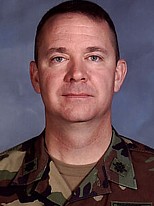Thomas H. Felts killed by I.E.D.
 Army Col. Thomas H. Felts Sr. believed he'd be instructing other officers someday, so he wanted to experience life in a war zone. He volunteered for Iraq duty to prepare himself to become a military teacher.
Army Col. Thomas H. Felts Sr. believed he'd be instructing other officers someday, so he wanted to experience life in a war zone. He volunteered for Iraq duty to prepare himself to become a military teacher.Felts, 45, a father of four from Sandston, Va., was killed Tuesday in Baghdad when an explosive device detonated near his vehicle, according to the Defense Department. He had been scheduled to visit his family for Thanksgiving.
Felts, a University of Richmond graduate, led a team that was helping train the Iraqi army. His tour interrupted his studies at the School of Advanced Military Studies at Fort Leavenworth, Kan., home to his wife, Kim, and three daughters and son.
Peter Schifferle, an instructor at the school, said his friend could have chosen to remain in school but instead made the difficult decision to leave for Iraq. Schifferle said Felts thought the tour would help prepare him to teach others.
"Tom volunteered for that job even though he didn't have to," Schifferle said. "Although he was a colonel, he had never personally been in combat. He volunteered to leave his wife and children."
Yesterday at Fort Leavenworth, Felts's family and friends gathered for a memorial service.
Felts sang in his church choir and played the guitar, said his brother-in-law, John Waldrop. He talked to his family from Iraq nearly every day via webcam.
"He was the kind of person you wanted to be around and wanted to be like," Waldrop said.
Felts had been in the Army for 23 years and had served at bases across the country, including in Colorado and Texas, according to officials at Fort Leavenworth. He started his military career as a cavalry trooper with the Virginia Army National Guard and was in the Reserve Officer Training Corps at the University of Richmond.
University of Richmond biology professor W. John Hayden recalled Felts as an inquisitive student who worked in his laboratory and helped him research the spotted-spurge plant. Hayden and Felts, who had a double major in biology and chemistry, would chat about science.
"He had a positive, can-do type of attitude," Hayden said. "It was, 'If that's what has to be done, we'll roll up our sleeves and do it.' "
From the Washington Post

<< Home